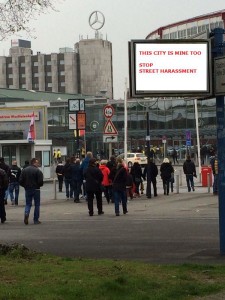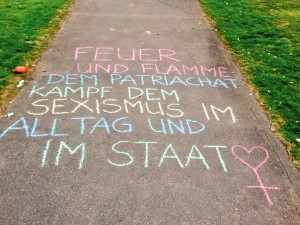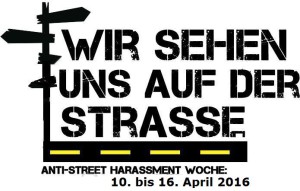ProChange, Germany, SSH Blog Correspondents
 Street Harassment, meaning the harassment in public space, is a problem in Germany that affects women* and girls as well as LGBTIQ*. It limits people in their participation in social life as it dictates when and where they leave their home and can even affect the choice of their place to live, their shopping opportunities, work options and hobbies.
Street Harassment, meaning the harassment in public space, is a problem in Germany that affects women* and girls as well as LGBTIQ*. It limits people in their participation in social life as it dictates when and where they leave their home and can even affect the choice of their place to live, their shopping opportunities, work options and hobbies.
According to a study conducted by the EU regarding sexual harassment, three out of five women* had experienced sexual harassment in Germany since they reached the age of 15. It is striking that according to that study, about one-third of the women experiencing sexual harassment did not regard it as “severe”; they accepted it without speaking about it to others. They mentioned shame as a reason for this, as well as a feeling of powerlessness for not being able to change something about their situation.
Street harassment is about power and control – and as the reality shows: street harassment is the entering crime and breeding ground for even more violent crimes.
Since the incidences on New Year’s Eve in Cologne and other cities, where women* were surrounded, sexually assaulted and robbed by supposedly brown men, street harassment and sexual assault are in the focus of public attention. The society is sensitized and the courage and willingness to report it has increased among the affected.
Maybe it is because of these circumstances that people did not turn their backs in this case: On the 25th of February, three young women* were observed, followed, photographed and filmed by two Afghan men*. The accused send the data to others, so that some time later up to 30 people showed up. It is not clear though if those people were further perpetrators or if they showed up out of curiosity. Physical assaults luckily did not occur. Attentive bystanders informed the security and called for police.
The extensive media response in politics and society is sadly not out of concern about the suffering and injustice against the affected. There is no outcry because we are suffering from diverse structures of power and hierarchy worldwide. Instead there is an outcry that those crimes are collectively committed allegedly by people described as foreign.
How about the law? What punishment do perpetrator have to expect?
Workplace
The General Equal Treatment Act (AGG) puts sexual harassment in the workplace under penalty. The employer has the duty to protect the affected employee from sexual harassment. Perpetrators can expect disciplinary consequences.
 Public Sphere/Street Harassment
Public Sphere/Street Harassment
In contrast, the public sphere is nearly a zone of impunity when it comes to the sexual harassment of women*. The penal code does not regard street harassment and sexual harassment as a criminal offence even though many organizations keep pushing for it for years now. The perpetrator who grabs under the skirt of a woman when getting on the metro does not, legally speaking, make use of coercion, nor does the one intentionally grabbing a woman’s breast in a crowded bus. When it comes to determining sexual attacks, it is not even always the offence of insult that can serve as catchall element.
Self-Defense?
Only few people know that the affected is allowed to defend her or himself during the attack. The right to self defense vanishes the very moment the attack is over and no further violations of the victim’s rights can be expected. If the perpetrator, for instance, kisses the affected on the mouth or touches her between the legs and then turns away, the affected, as long as no further attacks are to be expected, has no right to punish him or her back as the right for self defense has vanished. If the affected slaps the perpetrator in the face, this falls under the offence of bodily harm under the penal code.
If only the ones that recently proclaimed that women should button up their shirts^ , stood up for sexual self determination, the affected might have had the chance that perpetrators could be accused and sentenced.
Female Asylum Seekers in the New Asylum Legislation
Germany violates compliance with EU guideline 2013/33/EU of the European Parliament and the Council of Europe since July 2015 by not granting female asylum seekers the protection they deserve. The new asylum legislation (“asylum packet II”), overruled all protection measures, even intended minimum standards, although the existing shortcomings have been addressed over and over again. Women* do not only suffer sexual violence by fellow asylum seekers, but also employees of the security service can be perpetrators.
Our Conclusion
 Street harassment cannot be reduced to certain cultural or religious groups. The reasons can in fact be found in domination of people over people and are a product thousands of years of patriarchy which exist in different manifestations worldwide.
Street harassment cannot be reduced to certain cultural or religious groups. The reasons can in fact be found in domination of people over people and are a product thousands of years of patriarchy which exist in different manifestations worldwide.
We will continue to work for a change in the law and hope that the incidences of the New Year Eve and the resulting increase of public awareness will promote change.
Next to legal measures, it is of high importance too that we work for long-term changes in the perception of justice and shared responsibility within communities. This can be achieved by solidarity, raising awareness, networking, campaigns such as International Anti-Street Harassment Week, from 10th to 16th of April, with information, actions against street harassment, against everyday sexism and sexual assaults.
———–
^ Birgit Kelle, Dann mach doch die Bluse zu: Ein Aufschrei gegen den Gleichheitswahn, 2013.
ProChange is a group of people between 20 and 64 years of age who have been active for several years or decades now. ProChange consists of a small group of core members (pictured left) in a network of other activists. Our main focus is on street harassment, sexism and sexualized violence. We are opposed to all forms of exploitation as we believe that they are all connected.
